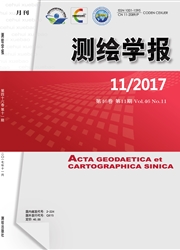

 中文摘要:
中文摘要:
基于分水岭变换的图像分割性能在很大程度上依赖于用来计算待分割图像梯度的算法。根据频域相位信息对图像特征的表征能力,引入相位一致的思想计算图像特征,应用Log Gabor小波提取高分辨率遥感图像的多尺度梯度。接着在对相位一致梯度进行分水岭分割时发现,在抑制分水岭算法的过度分割方面,经典的基于前景标记和背景标记的方法并不适合于遥感图像的分割,给出一种基于前景标记和梯度重建的分水岭算法。对IKONOS Pan图像上的农田、厂房和居民楼等地物进行特征提取和图像分割实验,结果表明相位一致方法优于空域特征检测算子,根据相位一致特征得到较好的分水岭分割结果。
 英文摘要:
英文摘要:
Segmentation of high-resolution remotely sensed imagery constructs the base of object recognition and object-oriented classification. Performance of watershed transform relies on the algorithm of gradient extraction from the original image. Phase congruency is introduced as a new methodology to detect gradient features from IKONOS Pan imagery. This model postulates that features are perceived at points in an image where the Fourier components are maximally in phase and that the type of features depends on the value of the phase. The multi-scale gradient images are obtained by applying Phase congruency model to the images with Log Gabor wavelet filters over 5 scales and 6 orientations. To restrain the over segmentation of watershed transform, Phase congruency gradient should be marked before the segmentation. But the classical method of marking with foreground and background is proved not suitable for high-resolution remotely sensed imagery. Then a new watershed transform algorithm based on foreground marking and gradient reconstruction is demonstrated. Feature extraction and segmentation are implemented from three types of objects selected from the IKONOS Pan imagery of Nanjing, i.e. paddy, workshop and house images. The results show that Phase congruency is better than Canny detector for the watershed based segmentation.
 同期刊论文项目
同期刊论文项目
 同项目期刊论文
同项目期刊论文
 期刊信息
期刊信息
